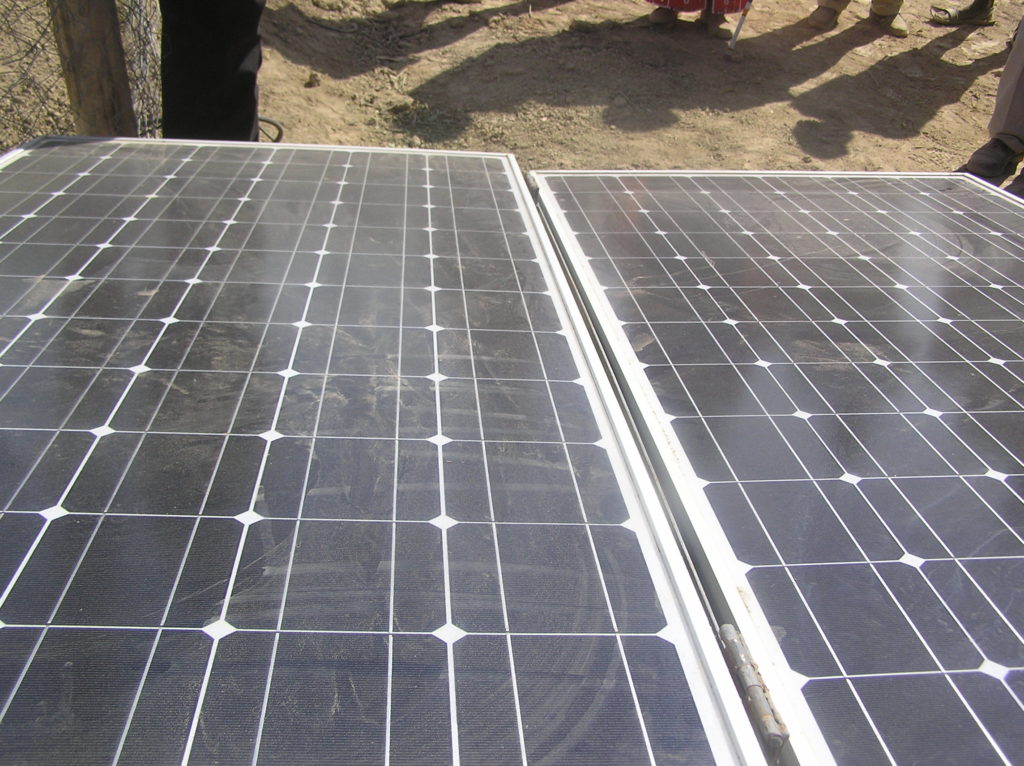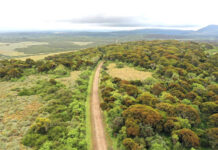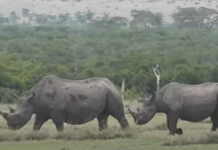By Mary Mwendwa
A group of maasai women are using solar energy technology for their smart farming to get better yields in the water stressed region of Nguruman, Kajiado County, Kenya.
Emaiyanata Self Help Group is a symbol of hope and resilience in Kajiado County by tapping into solar technology where they pump water for irrigation, where drought brings devastating catastrophes to the pastoralist community of the Maasai people.
They started growing tomatoes, onions, bananas, cassava and kales in 2014 and they have had a transformation.

“As women in this arid region of Lenkobei we sat down and decided to engage in agricultural farming to supplement our livestock which often succumb to drought hits.Our main problem is water and electricity and therefore we were advised to get solar panels which could help us pump water for irrigation,” says Sipion Ene Leketony, a member of the group.
She observes that all cows have been taken to the Nguruman Hills where they can get some pasture and water and that horticulture farming has proved that they can earn a living from crop farming as opposed to relying on livestock as the only source of income.
Leketony’s one and half acre farm has consistent water supply from Nguruman Hills stored in a dug pond with a capacity 120 cubic metres. The water is pumped using a solar powered system that fills a 5,000 litre tank for the drip irrigation technology that they use.The water is pumped using three solar panels each with a capacity of 129 watts .
According to Saaloi Leshashi, chairperson of Emayainata Self Help Group, the project is God sent. As the name loosely translates to a ‘blessing’ in Maasai language the women say “we have seen lives transformed here in Lenkobei village, children are now healthy , we get fruits from this farm and also vegetables.As you know meat is onlyfood here and milk and through this smart farming where solar technology has been used we are sing a big change in ecomony around here and also health wise”.
“We also have livestock but we cannot depend on them entirely, since their price drops when there is severe drought this leads to losses,” says Saaloi.

According to Saalo, climate change effects are real and cannot be taken for granted anymore. She notes that coping with changing climate has led to the improvement in diet as tomatoes and vegetables are grown in plenty.
According to Anthony Bainito, area Agricultural Extension Officer for Magadi Ward, Emanayata Group is just an example of how communities can build resilience to the effects of climate change through smart farming.
According to Bainito, the trainings are now bearing fruits.
“Although at first it was not easy to convince them, the pastoralist community is slowly embracing crop farming,” says Bainito. He adds: “Drip irrigation using solar energy has been the best technology in this water stressed.”
With the limited water supply, farmers are able to irrigate their farms using little water. According to Joseph Ntiiti, Chief Lenkobei says that high level of poverty and illiteracy are some of the challenges facing his people.
“All we need is exchange field trips to other regions to expose local farmers to modern farming methods practically,” explains Ntiiti.
He notes that the region needs diversification whereby livestock keeps could be in a position to change their lives.
The group earns over KSh28,000 every month from sale of the produce which is saved as a revolving fund to help the members in paying school fees and other emergencies.
The women’s project which has received massive support from the men, aims at enhancing nutritious food production at household level, creating awareness on food production technologies, enhancing income generation and creating employment opportunities for both youth and women.

According to 2014 Drought Outlook Report, the Government of Kenya declared an impending drought with an estimated 1.6 million people being affected. After a poor performance of the long rains between March and May 2014 in the arid and semi-arid zones, the drought situation continued to affect both pastoralist and marginal agriculture livelihood zones (North Western, Northern, North Eastern, South Eastern and parts of Coast) with an impact on households’ food availability as well as livestock productivity. This has continued to exacerbate in many dry regions like Kajiado County.
The group started farming with technical support from Arid Information Network (ALIN), Act Change Transform (ACT), Swedish Embassy and UKaid with land being donated by Shompole Group Ranch..















